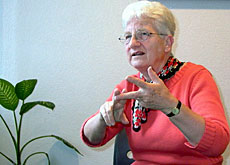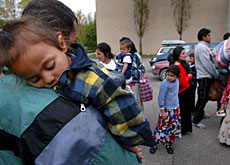“Our asylum policy ignores basic human needs”

Since the beginning of April, asylum seekers whose applications have been turned down are no longer entitled to welfare benefits.
For former parliamentarian, Angeline Fankhauser, these new measures risk leaving people destitute.
The government’s decision to cut welfare benefits for failed applicants is part of a controversial programme of public spending cuts totalling SFr3.3 billion ($2.6 billion).
The asylum sector is one of the hardest hit, with spending to be slashed by SFr137 million over the next three years.
The government believes that by cutting welfare payments it will deter bogus asylum seekers from coming to Switzerland.
But some cantons, towns and aid agencies say the measures are too harsh.
Fankhauser, a centre-left Social Democrat, who focused on rights for asylum seekers during her time in parliament (1983-1999), is among those voicing their concern.
swissinfo: You left parliament over four years ago. How do you think asylum policy has evolved since then?
Angeline Fankhauser: First of all I have the feeling that asylum policy is disappearing off the political agenda. I have noticed that things are becoming tougher and tougher. Little by little, the aims of those opposed to asylum seekers are becoming reality.
The human rights movement has been sidelined. I have the impression that asylum policy has become a purely bureaucratic issue. This generation is more concerned with terrorism and war. The issue of human rights lacks sex appeal.
swissinfo: Since April 1, failed asylum applicants no longer have access to welfare benefits. The government wants to save money and at the same time encourage these refugees to leave the country. What do you think about this decision?
A.F.: It’s serious. I wouldn’t go as far as to say we are starving these people, but we are pulling the carpet out from beneath their feet, in the hope that they will disappear. It’s a disaster.
swissinfo: Aid agencies for refugees are worried that asylum seekers who have been turned down will now get caught up in crime. Do you agree?
A.F.: In many poor countries, people survive rather than live. It is surprising what lengths people go to in order to stay alive.
This leads to crime, and also represents the end of a stable society. So, our asylum policy no longer has anything to do with the real needs of human beings.
swissinfo: The new measures concern asylum seekers whose applications have been turned down. Do you have any doubts over the procedures behind these decisions?
A.F.: No, I think the procedures are in order. But the regulations for these procedures are not always put into practice. Migration and asylum policies are indicative of the state of our modern society.
The most important aim is still to ensure that the situation in a refugee’s home country improves. People who are able to lead a normal life in their country don’t try to flee.
swissinfo: A large part of the population supports the toughening of asylum policy. What do you make of this?
A.F.: The argument is fuelled by so-called “abuses” of asylum. In the beginning we played down the issue, saying “abuse” was not the most important aspect of asylum policy. I still stand by this. But we should have analysed the issue more closely.
Many Swiss hadn’t expected asylum seekers to make the most of their rights under Switzerland’s democratic system.
swissinfo: What do you say to Swiss people who are scared that asylum seekers bring about an increase in violence at school, drug trafficking, etc.?
A.F.: Crime is a reality in our society. It is a fact that refugees are partly responsible for criminal acts. But we mustn’t generalise. I applaud measures taken to combat crime, but we can’t treat asylum seekers differently because of what they are.
Of course, I don’t want delinquent asylum seekers to show up. The problem is we can’t just send them back to their countries. We must find out which countries are letting their criminals leave.
Generally speaking, we lack the means to improve integration and reunite people with their families. It’s not just up to the refugees to adapt.
When I was a child, people in big cities were scared of people from towns or other cantons, particularly poor children. I saw a confrontation between poverty and wealth. I think the main thing Swiss people are scared of is poverty.
swissinfo-interview: Andreas Keiser (translation: Joanne Shields)
Angeline Fankhauser is a member of the centre-left Social Democratic Party.
She was a parliamentarian between 1983 and 1999.
During her time in parliament, she was an avid campaigner for human rights, in particular for asylum seekers.

In compliance with the JTI standards
More: SWI swissinfo.ch certified by the Journalism Trust Initiative

You can find an overview of ongoing debates with our journalists here . Please join us!
If you want to start a conversation about a topic raised in this article or want to report factual errors, email us at english@swissinfo.ch.